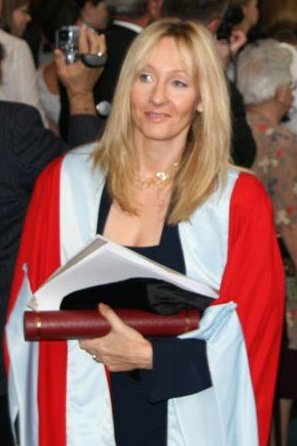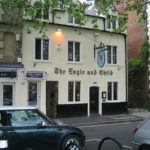The Inklings, Part 3 – J. K. Rowling, An Honorary Member?
 As early as 2000 John Granger, author of several books about Harry Potter, floated the idea that the creator of the series, J. K. Rowling, was at least an Inklings wanna-be. In part he debunks the idea that Rowling’s rise to fame is a Cinderella story — the welfare single mom making good against all odds. Instead, because of her background in the Classics and her ability to draw on ancient and medieval philosophy, her work is to be taken seriously and studied with as much vigor as that of the Inklings before her.
As early as 2000 John Granger, author of several books about Harry Potter, floated the idea that the creator of the series, J. K. Rowling, was at least an Inklings wanna-be. In part he debunks the idea that Rowling’s rise to fame is a Cinderella story — the welfare single mom making good against all odds. Instead, because of her background in the Classics and her ability to draw on ancient and medieval philosophy, her work is to be taken seriously and studied with as much vigor as that of the Inklings before her.
The idea became one of debate apparently. A member of The Chamber of Secrets forum brought up the issue, first defining the Inklings in this way:
This is an explanation of what an Inkling writer was:
Neither antihistorical, nor ahistorical, the Inklings’ view of myth is that it evokes awe, wonder, passion, and, what is more, pursuit—a culture’s myth is the story that has the power to explain the origin and destiny of a people, the text that orients them in history, guides them in the present, and points them to a future in which they and their offspring will live and move and have their being. Hence the Lord of the Rings and the Chronicles of Narnia. Myth places them in the presence of their creator and benefactor, judge and advocate, and answers the questions when, how, who, and why. A “true myth” has the power to explain where we came from, shape our identity and purpose, instill hope, promote justice,sustain order. That is why Lewis can describe the Christian gospel in these terms: “as myth transcends thought, Incarnation transcends myth. The heart of Christianity is a myth which is also a fact. . . . Christians also need to be reminded . . . that what became Fact was a Myth,that it carries with it into the world of Fact all the properties of a myth.”
So an Inkling writer wrote about Christian themes using ideas and characters that represented those Christian beliefs.
The member then posed the question: Are the Harry Potter books really about Christianity?
While much of the discussion centered on Rowlings’ similarities/influence from C. S. Lewis and J. R. R. Tolkien, Jason Fisher, editor of Tolkien and the Study of His Sources, broadened the conversation to include Charles Williams. Pointing to one specific likeness, he said
Of course, independent invention is entirely possible. I have never heard that Rowling was a fan of Williams (though she has admitted a liking for Tolkien and especially Lewis). But the resemblance is striking, isn’t it? It could just be possible that Rowling has read Williams and picked up this clever little motif from him. It is remarkably specific, and I can’t recall anything like it anywhere else in my reading history.
Before the final Harry Potter book came out, one blogger framed the question about Rowling this way:
The ultimate question does seem to be whether Potter will live or die and, if in dying, Rowling is taking her sub-creation (hello J.R.R. Tolkien) closer to the kind of truly tragic ending that is going to push millions of readers — secular and religious — to wrestle with big, even eternal, issues. Is she, in effect, a kind of postmodern, progressive Inkling?
The discussion continued years later in a Google group
Is there a common denominator for the Inklings in which tradition
Rowling follows? …Is it correct that Rowling is ‘following in the tradition Inklings’?
And if so, in what way(s) is this correct?
The fact is, no one can be a part of a group after the group has been disbanded and all its members dead. The Inklings collaborated with one another, critiqued, encouraged, and challenged each other — none of which someone writing years later could enjoy.
But did Rowling write in the Inklings’ tradition? David Kopel, in his review of Granger’s book, said
The Inklings were originally a group of Oxford dons who wrote Christian fiction. The most famous of them are J. R. R. Tolkien and C. S. Lewis. Lord of the Rings and the Narnia series never mention Christianity overtly, and in Tolkien’s books, religion itself is absent from the plot. Yet these mythopoeic books aim to “baptize the imagination” of the reader — to teach her the importance of fighting for the right, no matter how powerful the forces of evil may appear.
Using that definition, I’m not sure I see a great difference from what we think as traditional fantasy. So what do you think? Where does Rowling belong in connection to the Inklings?









































I would say that an element I find in the Inklings’ work that often is lacking in modern fantasy is a bridge to older works. Tolkien had direct links to Norse mythology, and Lewis had elements from Paradise Lost in the Magician’s Nephew. Although I only read Potter once, I find no deeper connections to be drawn.
Might I encourage you to give them a second try? Rowling presents a depth of connection to mythology and classical literature, spanning from Jane Austen, Shakespeare, Dante, Spencer, Milton, Dickens, Shelley, Bram Stoker, the Bronte sisters, Dorothy Sayers, Chaucer, not to mention Lewis and Tolkien themselves, plus dozens of fables and fairy tales and even ancient Greek literature like The Libation Bearers by Aeschylus.
Can you give me a specific example, then? I have to admit, it was a while ago I read them.
Granger has a whole book on the literary backgrounds and allusions in the Potter books: Harry Potter’s Bookshelf, and even then Penguin made him cut the book to half its size from what it originally was.
I’ll offer three major allusions. First, to The Libation Bearers by Aeschylus. The play revolves around three children/young adults – two boys and a girl – who must go on a quest to kill the man who murdered their parents in order to save the world, all done according to prophecy. The principal character, named Orestes, has a forehead scar that commemorates the murder of his father. And in one version of the story, Orestes ends up marrying a girl called Hermione. No joke. Rowling then quotes from The Libation Bearers as the first of the two epigraphs at the beginning of Deathly Hallows.
Second, Dante. The Divine Comedy was written, in part, to commemorate the love and the journey Dante would go on to reach his beloved, the beautiful Beatrice. Dante has loved Beatrice since they were young and as he passes through Purgatory and tries to reach Paradise, Dante gazes into Beatrice’s green eyes and finds within them the gateway to Paradise. So too (SPOILERS! READ NO FURTHER IF YOU HAVEN’T READ THE LAST POTTER BOOK! DON’T SAY I DIDN’T WARN YOU!) Snape has loved Lily since childhood and as he lays dying, he commands Harry to look at him; Snape gazes into Harry’s eyes (“You have your mother’s eyes”), which are green like his mothers, and in the green eyes Snape dies and enters paradise.
Third, King Arthur. There are numerous allusions to King Arthur throughout the books, but the Deathly Hallows themselves mirror the Arthurian quest for the holy grail. This can principally be seen in the last Hallow, the Elder Wand or Wand of Destiny. One of the objects Arthur quested for was the Holy Lance that pierced Christ’s side, known as the Spear of Destiny. Another object they quested for was the sword of King David, which is paralleld by the quest to find the sword of Godric Gryffindor. They also searched for the Grail itself, the cup used at the Last Supper, and it just so happens that one of the Horcruxes was the cup of Hufflepuff. Another object Arthur searched for was the dish or plate used to hold the bread in the Last Supper, which is parallel to Slytherin’s locket. Further, there are WWII overtones to the Potter books, and Grindelwald and Voldemort’s obsession with the Wand of Destiny parallels Hitler’s obsession with finding the Spear of Destiny. In some of the Arthurian legends the Grail isn’t a cup but a stone that gives one the power to raise the dead, which parallels the Resurrection Stone Hallow. The last name of the three wizards from the Hallows tale is Peverell, a derivative of Peveril, which is another name for Parzival or Percival, one of the knights of the round table. There is also an old British legend called the “Thirteen Treasures of Britain,” and two of them are of interest. The final treasure is known as the “Mantle of Arthur,” believed to make the wearer invisible and parallels the Invisibility Cloak Hallow. The twelfth treasure is a chessboard with living chess pieces, parallel to Rowling’s “wizard chess” game. And lastly, in Deathly Hallows, Harry dives into the frozen lake to retrieve the sword of Godric Gryffindor which has substantial overtones to the lady of the lake (parallel to the silver doe that represent’s Harry’s mother which leads him to the lake) which gives Arthur the sword Excalibur. I’ve also written a brief Arthurian connection to Neville’s actions in slaying Nagini that initiates the final battle for Hogwarts. Travis Prinzi also has an entire chapter on connections between Arthur, Gwain and Harry in his excellent Harry Potter and Imagination, focusing on character issues like courage and flaws.
Wow…that was impressive.
Thanks, Adam. Those examples illustrate the point beautifully. I’m happy to know that more and more people are taking a serious look at the Harry Potter book, applying the same kind of scholarship that they give writers like the Inklings. John Granger has gone a long way to advance that approach.
Becky
To be fair, this post happened to catch me as I’m working on the final stages of my own book on the merits of the Potter series from a Christian perspective, so all this stuff is in the forefront of my brain. Otherwise I might not have been able to answer so comprehensively!
She does indeed. Rowling was educated in the same classical literary tradition of Lewis and Tolkien, grew up in the same liturgical Episcopal/Catholic tradition, a liturgical tradition which informs her books, structured as they are after the Christian liturgical calender (in each of the Potter books, the major redemptive turning points take place on Christmas, Epiphany, Easter, etc., just as in LOTR, the company sets out from Rivendell on December 25th and the Ring is destroyed on March 25th, the date of the Annunciation to Mary and the Incarnation). Numerous studies by Inkling scholars have shown that Rowling’s books follow Lewis and Tolkien down into the details of her work, including the understanding of magic presented by Rowling’s books, and Harry’s sacrificial walk into the woods just as Aslan walked voluntarily to his own death. She’s also clearly knowledgeable about Tolkien’s writing because she’s able to quote from Tolkien’s letters, not just LOTR.
Thanks for broaching the subject though! I know it is still taboo for lots of Christians to think this way. So, to conclude, I would like to finish with a few revealing comments by Rowling herself in various places:
“Those two quotations that Harry finds on the tombstones in Godric’s Hollow, they almost epitomize the whole series. I think they sum up all the themes in the whole series.” These two quotations are Matt. 6:21 and 1 Cor. 15:26.
“No one in my family was a believer. But I was very drawn to faith, even while doubting . . . . so I was the one who went out looking for religion.”
“There was a Christian commentator who said that Harry Potter had been the Church’s biggest missed opportunity. And I thought, there’s someone who actually has their eyes open.”
“I believe in God . . . I go to church myself . . . but no one ever really has gone any more deeply into it than that, and I have to say that does suit me, because if I talk too freely about that I think the intelligent reader, whether 10 or 60, will be able to guess what’s coming in the books.”
“My ambition is to write books that the reader won’t necessarily get completely at the first reading.”
“Perhaps my favorite painting is Caravaggio’s Supper and Emmaus when Jesus reveals himself to the disciples having risen from the dead. I love it. Jesus looks very likable – soft and rounded – and the painting captures the exact moment when the disciples realize who this man is, blessing their bread.”
Well, since that sums up what Harry Potter is all about, I’d say Rowling deserves to be counted with the Inklings. Heck, she probably has more overt Christianity than they did, making a Bible verse the war cry of the final book.
And just as a story, HP is a fantastic one with lots of links to classic fairytales. She even goes so far as to make up a fairy tale in the final book to encapsulate the struggle that is going on.
John Granger made a compelling argument for book two, at least, having a significant amount of Christian symbolism (the article I linked to in the article focused on that one book). He mentioned, too, Rowling’s “tip of the hat” to the Narnia books when she named one character Cedric Diggory. Lewis’s Narnian professor was Diggory Kirk — supposedly a portrayal of Lewis himself.
I’ve not gone back to read the books looking for the allusions to other myths, but I trust those who have done so. Plus, if you have a broad scope of stories to draw from, including ancient and medieval classics, why wouldn’t you use them? I, on the other hand, don’t know Greek mythology well, and Celtic hardly at all. I’m not prone to turn to those stories for ideas. But Rowling was very knowledgeable in those , as were the Inklings.
Becky